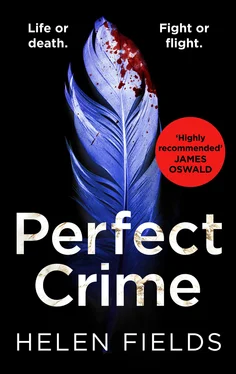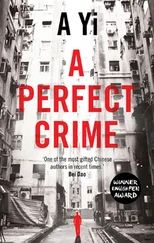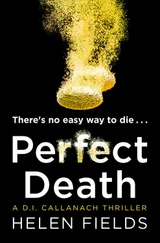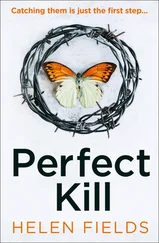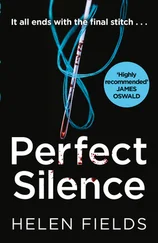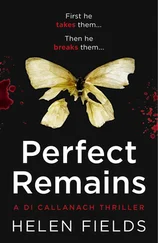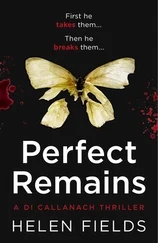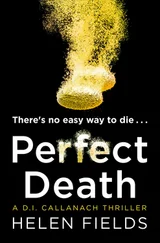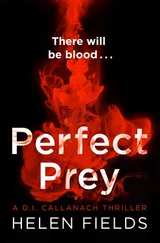He sat down at Ava’s computer and identified the case file on Stephen Berry that had been referred to the prosecutor’s office.
‘What have we got?’ Ava asked.
‘The man with the missing fingernails is Stephen Berry, thirty-two years old. Address is a flat on Comely Bank Row. He was on bail for possessing a large knife, which he revealed to a taxi driver during a journey. Hadn’t proceeded to charge yet, but it’s not clear why. I’ll take Tripp and check it out. You stay in that chair and get some rest.’
‘Uh huh, and send someone to massage my feet too, would you?’
‘Still funny, even after you nearly fell off the top of a castle. I’ll call in as soon as I have any information.’
An hour later, Callanach and Tripp were heading into the city, to what appeared to be a private house. The windows were blacked out and the door had a video security system. A minute after they buzzed, a young woman allowed them entry and sat them in a comfy lounge where soft music was being piped gently though speakers. All the artwork featured either calm seas, woodland mists or desert sunrises. Max Tripp picked up a leaflet from the table and read aloud.
‘“The Reach You charity was founded in 2002. They have six drop-in centres, do outreach work at a variety of clinics and addiction groups, are accessible through your general practitioner, hospital or hospice, and run a 24–7 suicide helpline.” These guys are really well set up. Says here they got a lottery funding boost in 2006 that allowed them to take on a number of new full-time staff who work with a large team of volunteers.’
‘It did,’ a man said as he walked in, holding his hand out to shake Tripp’s. ‘I’m Rune Maclure. How can I help you?’
‘I’m DC … DS Tripp,’ Max stumbled, ‘and this is DI Callanach. I’m afraid we have sad news. You were instrumental in talking down a man who was ready to jump from the Queensferry Crossing last month. We got your name from the police statement.’
‘Stephen Berry,’ Maclure said quietly, his face falling. He sat down, taking a moment. ‘Can you tell me what happened?’
‘He died following a fall from the walls of Tantallon Castle. It was instantaneous. The pathologist was clear that he wouldn’t have suffered,’ Callanach said.
‘Thank you. I’m afraid the problem with suicide is the amount of suffering it takes to get to the point of ending it all. A second of agony at the end doesn’t even come close to being a concern for most of the people I see.’
‘Of course,’ Callanach agreed. ‘Can you tell us what you knew about him?’
‘Not very much, to be honest. Reach You is on the emergency services list to provide experts who assist in suicide attempts – either about to happen, or failures – for people who need help afterwards. I assume the taxi driver called it in as soon as he’d let Stephen out of the cab. The police called our central number and they put a call out to see who was in the area. I was nearby and able to be at his side in a few minutes.’
‘That was lucky,’ Tripp said.
‘Not really. It didn’t save him in the end, did it?’ Maclure rubbed his temple. ‘Our statistics are pretty good. Most people don’t go through with the attempt, they just need to work out where they’re at. Of those who do try, most suicides aren’t successful, either because there’s a sudden will to live that kicks in and sabotages the attempt, or through simple lack of research. There are about seven hundred suicides in Scotland every year, more men than women, the biggest group being Stephen’s age category.’
‘How did you talk him down?’ Callanach asked.
‘There was someone he cared about, a young woman. I’m afraid I can’t remember her name now, but it’s in my notes if you need it. Often, in the heat of the moment, the details get a bit blurry for me. They’d been in a serious relationship, though recently split. I was persuading him to call her. I find that making a meaningful contact often changes a person’s mind about ending their life. He slipped on the railings before making the call, realised he didn’t want to die in that moment and I was able to help him back up.’
Callanach felt the room slide, seeing Ava slipping through his arms again, certain he was going to drop her, already feeling the dreadful loss of her before she’d gone. The potential for grief had hit him with overwhelming force.
‘Are you all right?’ Maclure asked him.
‘Yes, sorry. I was imagining how scary that must have been. For him and for you,’ Callanach replied.
‘We’re simply trained to do the very best we can. If we took responsibility for everyone we came into contact with … well, you wouldn’t last very long at this job. I was really pleased when he came down. Obviously, the police had to question him, but I gave a statement and spoke on his behalf, asked the police to consider not prosecuting for the knife. They said they’d refer the matter to get a decision quickly.’
‘Why did he do it?’ Callanach asked.
‘Stephen was bipolar. His prescribed drugs weren’t helping consistently, which is something many sufferers experience. All premature deaths are tragedies, but when they’re caused by a neurotransmitter problem in the brain, how do you come to terms with that as a family member? We can put men on the moon but medicine isn’t advanced enough to treat this. Such a waste.’ Maclure shook his head, lacing his fingers behind his hair and giving the ceiling a long look. ‘Sorry. You’re here for help, not to listen to me moaning.’
‘I think you’re entitled,’ Tripp said. ‘I can’t imagine how you do your job every day.’
‘Trying to make a difference, same as you,’ Maclure said. ‘I still see a better side of humanity than if I worked in a bank. What else can I tell you?’
‘What was your last contact with him?’ Callanach asked.
‘I saw him twice after the suicide attempt. The first time was two days afterwards. He came here to see me and thank me for what I did. I told him what we could offer, tried to persuade him to get counselling, but with bipolar disorder that feels like a drop in the ocean. To Stephen’s credit, he agreed, although I realised he was reluctant. The last time I spoke to him, he phoned to say he’d changed his mind and didn’t think the counselling would help. He cancelled the session.’
‘Are there any notes?’ Tripp asked.
‘Yup, I’ll get a copy for you. As he’s deceased, confidentiality ceases to apply. I couldn’t talk him into getting any more help. There’s a limit to how pushy we can be, or we push people away from us at the time when they need us most. It’s a fine line.’
Callanach bet it was. Trying to persuade people to open up to you, knowing it would initially at least be pouring salt on their wounds. Wanting to help people who wanted to be left alone.
‘Did Stephen talk to you about any other problems in his life? Anything external to the bipolar disorder? Debts, addictions, conflicts, for example?’ Callanach tried to make it sound casual, but there was no way of hiding the fact that they were digging.
‘None, although I didn’t have much time to explore that. He certainly didn’t reveal anything to me. He seemed like a genuinely nice man, to be honest. Likeable, thoughtful. He left his donor card at the roadside in case anyone could be helped after his death.’ Maclure smiled and Callanach was drawn to him.
Maclure had a gentleness about him that was all warmth and ease, which reminded him of Ava. The two of them would get on like a house on fire, Callanach thought. Maclure would be the perfect foil to her stresses, and Maclure would like Ava’s natural intelligence, passion and empathy. Neither was the least bit bothered by social structure or setting out to impress. They did their jobs only to serve. Ava would like him.
Читать дальше
